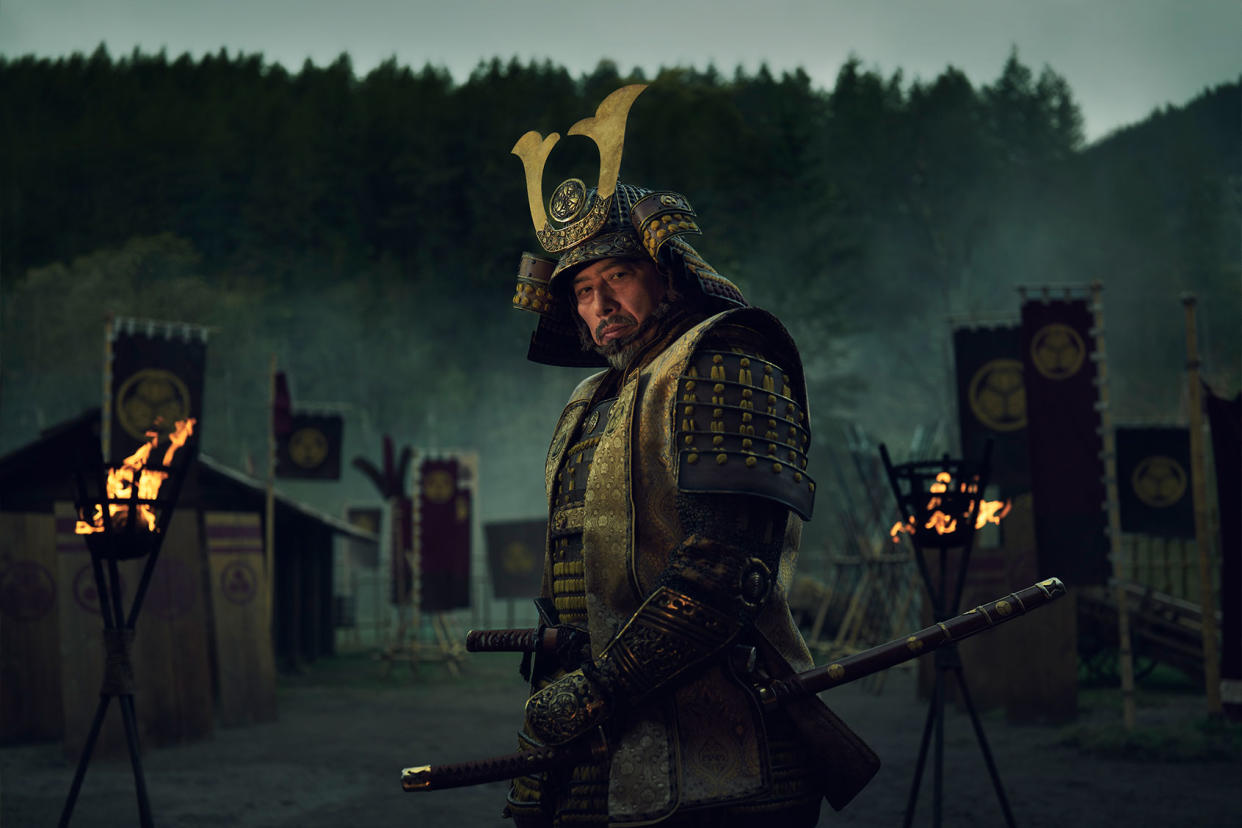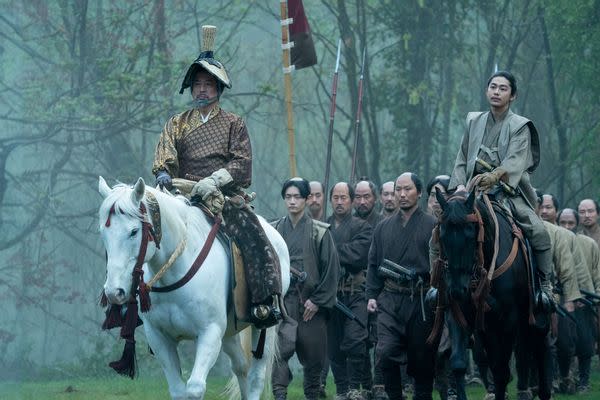"We need that kind of hero": "Shogun" star Hiroyuki Sanada on playing a leader who wants peace

- Oops!Something went wrong.Please try again later.
This is not your father’s "Shogun."
FX's new adaptation of James Clavell's 1975 bestselling novel challenges the idea of whose story gets told. The 1980s miniseries version of "Shogun" is shown from the point of view of an English sailor (Richard Chamberlain) taken hostage in Japan who eventually helps a daimyo (Toshirô Mifune) rise to the shogunate. The new series, however, re-centers the Japanese perspective of feudal Japan, creating more understanding and relying less on exoticizing. Produced by and starring veteran Japanese superstar Hiroyuki Sanada, the 10-episode limited series streaming on Hulu is rooted in authentic representations of Japan and the Japanese in the 1600s.
Sanada stars as Lord Yoshii Toranaga, who must fight both politically and militarily for life as his enemies on the Council of Regents unite against him. Meanwhile, westerner John Blackthorne (Cosmo Jarvis), crashes his ship in a Japanese fishing village, becoming someone who could help Toranaga tip the scales of power. Toranaga’s and Blackthorne’s fates become inextricably tied to their translator, Toda Mariko (Anna Sawai), a Japanese noblewoman whose Christian faith and loyalty to Lord Toranaga play out in complex ways.
Toranaga is loosely inspired by Tokugawa Ieyasu, who began the Tokugawa Shogunate of Japan in 1603 and was considered one of the three "Great Unifiers" of the country. Blackthorne is modeled after William Adams, the first Englishman to reach Japan. Watch a trailer for "Shogun" below:
Salon talks to Hiroyuki Sanada about his vision for the series and his career playing samurais.
What inspirations did you draw upon to create this new "Shogun" series?
Very beginning, I thought [of] Toranaga's real-life model, leyasu [who], after the war period finished, created the peaceful era for 260 years until we opened the country to the world. So that's why he became a hero in Japan. And for me, I felt telling the story about his life is important, especially for now. We need that kind of hero. That's why I took this role and then tried my best to put my dream into this show to bring to the world.
Your first Hollywood role was in "The Last Samurai." How do you see your role in "Shogun" differing from that film?
That was my first experience in Hollywood. And then after that, I decided to come to LA. From Tokyo to LA, I moved in and tried to continue choosing the international project. All the experience I've done in LA, I could use everything in this show. So as an actor, year by year, I feel comfortable to work in Hollywood. And also this time, l've done the producing as well. So l could prepare everything before: I am sitting in front of the camera. So [I am] more confident and relaxing, and I really enjoy to play the character.
You've played various different samurai in your career. How would you say your roles have evolved from the very beginning to this role?
Yeah, all my experience in this role and the show, which I've learned since l was a child actor. I had a lot of great masters [who] taught me a lot. So I put everything into this show and try to teach young actors on set. All the experience worked to create this character and the show, I believe.
I read that you do most of your own stunts.
For me, you know, doing everything by myself is a very important thing. And when I started training, I thought the leading actor doing everything by own self is a good service to the audience, which I felt when I was a kid. That's why I started training. So that was a starting point. And then in the future I want to do everything by myself. So even getting older, as much as possible, I want to do everything by myself.

The original "Shogun" television show was more centered on John Blackthorn, whereas your series is more centered on your character, Lord Toranaga, and the Japanese world. Can you talk about the evolution?
This time, we created the script, not only through the telling [of] the story through the blue eyes, [but] more Japanese lenses to explain our culture or the story. So that's a big difference, I think. Most of the audience will see Feudal Japan, 1600 Japan through [Blackthorn’s] eyes at the beginning. And little by little, they [are] gonna start understanding what I am thinking, what [the] other Japanese characters [are] thinking, what's going on. So Blackthorne, he's learning Japanese words little by little and then wearing kimono, wearing the sword, and he's gonna understand what the Japanese culture is. Like him, the audience will understand, step by step, each episode. So, very important his position is.
Hollywood has seen the "Shogun" world often through fantasy. I think about your "Westworld" portrayal of swordmaster Musashi in what's literally a fantasy theme park. This series seems much more authentic and centered on the Japanese perspective. Is that something that you really wanted to bring out?
Yes, indeed, but it's case by case. Each production has [its] own world and especially "Westworld" was a theme park. So Western people made our robot and then created for the Western people the image.
But this one ["Shogun"] had to be authentic. [The] novel is a fictional entertainment, but to make the story believable or the character, we needed to make authentic [so] nothing’s a bother to the audience to focus on the story, to follow the characters. That’s why this time we need it. But case by case, each production has a different reality level.
Want a daily wrap-up of all the news and commentary Salon has to offer? Subscribe to our morning newsletter, Crash Course.
You bring up the novel, which is written by a white man. How do you bring authenticity to a source material that is from a literal Western perspective?
Yeah, this time we tried to make the show not too much Westernized, not too much modernized. So just keep authentic as 1600 Japan. That's our goal. As an entertainment, the story or characters [were] original, but [the] background of the history or props, costume, movement, had to be authentic.
We had a Japanese crew [with] experience [in] historical drama. Wigs, costume props and the master of gesture – this is very important. We had a team of professionals, so that helped us a lot.
What do you want audiences, especially Western audiences, to learn about Japanese culture and history through the series?
More than action, more than just ceremony things, [the] mental thing is most important, I think. Loyalty and [to] serve somebody and sacrifice, patience – all of them we need for now. So we can pick up something important mentally to use in the real world to make a better future together.
"Shogun" premieres with two back-to-back episodes on Tuesday, Feb. 27 on Hulu and at 7 p.m. ET on FX. New episodes will drop on Tuesdays.

